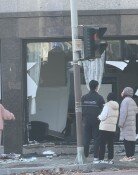National Assembly Hearing ``Korea Economy Trapped in Public Funds``
National Assembly Hearing ``Korea Economy Trapped in Public Funds``
Posted June. 11, 2001 16:10,
▼ Public Funds, National Debts
The controversy over the scale of the public funds and the national debts, and the plan to recover the public funds was repeated.
Rep. Kim Bu-Kyum (the Grand National Party, GNP) maintained that `` The amount of a loss of the Korea Deposit Insurance Corporation already came to 50 trillion won, and the principal public funds which were used thus far, amounted to at least 135 trillion won. The Korea economy was caught in a trap of the public fund``.
Rep. Na Oh-Yeon (GNP) demanded the measure to recover the public funds, saying that ``The national debts amounted to 120 trillion won by the IMF standard, and thus10 percent of the national budget should be used only for the interest payment until 2007.
``The public fund of 104 trillion won whose recovery rate is only 24 percent, the potential debts of 230 trillion won of four pension corporations including the National Pension Corporations, the debts of 447 trillion won of the 104 state-owned companies which have increased since the current government established a regime, are also likely to turn into the national debts,`` he added.
On the other hand, Rep. Song Young-Gil (the New Millennium Democratic Party, NMDP) placed the responsibility for the public funds and the national debts on the opposition party, saying that ``The IMF affairs had derived from the corrupted relations between politics and economics as seen in the Hanbo affairs or Kia affairs. And thus it was the deep-rooted problem which occurred because the then-ruling party, GNP did not have the ability and the will to solve the economic deadlock``.
Rep. Ahn Dae-Ryun (the United Liberal Democrats, ULD) asked what countermeasures the ruling party has, saying that ``The experts anticipated that the public funds of 50-70 trillion won will be irrecoverable among 134 trillion 700 billion won which were used until the end of March. The Mckinsey report that was recently released, prospected that the public funds of 78 trillion won should be input additionally``.
Jin Nyum, the Deputy Prime Minister and the Minister of Finance and Economy, told that ``The recovery of the newly input public funds will be thoroughly confirmed by `the committee on the public funds` which is comprised of the civilians``.
▼ Tax Investigation on the Press
Rep. Na Oh-Yeon criticized the tax investigation on the press that ``The ratio of tax investigation on the business corporations was only 2.7 percent. Why should all the central press be under investigation? It is the abuse of the right of the tax investigation to uniformly investigate the central press on the pretext of the regular investigation without any legal ground, after the settlement of the tax amount under the current voluntary report and payment system``.
And Rep. Na urged to stop the tax investigation in order to gag the press on the political purpose, and to establish the institutional measures to prohibit the abuse of the right of the tax investigation.
Prime Minister Lee Han-Dong answered that ``I was reported the tax investigation has been carried out on the normal level. Because the issue of the equality may be raised when only a certain company is investigated, the government had to perform the tax investigation on all press companies``.
▼ `Chaebol` Reform
While the representatives of the NMDP maintained the continuous `chaebol` reform, the representatives of the GNP asserted that the current government failed to reform the chaebol. For the market management, while the representatives of the NMDP stressed the observance of the principles and the rules through the government`s intervention, the representatives of the GNP emphasized the deregulation measures.
But both the ruling and the opposition parties agreed that it is necessary to elevate the corporate`s transparency and to improve the business management environment.
Rep. Kang Un-Tae (NMDP) contended that ``It is a pity that the ease of the regulation on the chaebol has been varnished as if it is the ingenious way to revive the economy. The controlling shareholders of the 30 top-conglomerates have 642 subsidiaries whose scale of the asset amounts to 437 trillion won. Under the circumstance like this, it is nothing but an ideal plan to maintain to secure only the transparency, and to abolish all other regulation measures.
But Rep. Na Oh-Yeon criticized that ``The government lost the equal application of the principles by the failure of the big-deal and the restructuring, and the preferential support to a certain conglomerate which is the Hyundai Group``.
Rep. Ahn Dae Ryun also told that the governement`s customary regulations on the companies have weakened the autonomous ability and the competitive edge of the companies.
Rep. Kim Bu-Kyum pointed out that ``The chaebol policy should not aim at depressing the entrepreneurs` business morale or enhancing the regulations in order to meet the peoples` sentiment. Currently, the government has not only accepted all demands of the business sector, but also has offered the pro-chaebol policy indiscreetly.
Yoon Young-Chan yyc11@donga.com




![[김순덕의 도발] ‘李부터 연임’ 개헌, 이 대통령은 가능성을 말했다](https://dimg.donga.com/c/138/175/90/1/wps/NEWS/IMAGE/2026/01/16/133172656.1.jpg)


